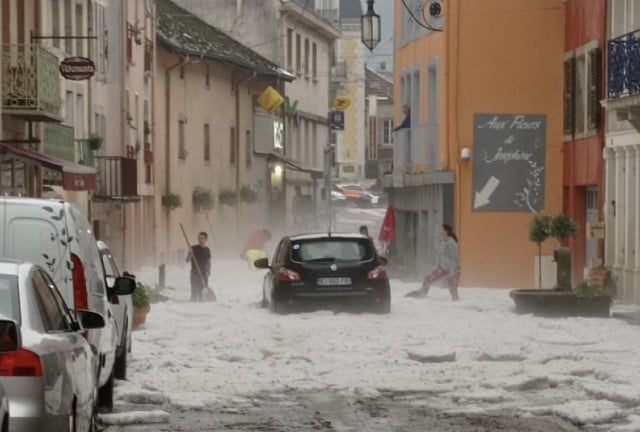The hail struck the town of Plombières-les-Bains in the Vosges mountains on Tuesday morning.
Romain Munier, head of communications for the local emergency services, told French media: “There were up to 60 centimetres of accumulated hail” while in the wider area, “up to 10 millimetres of water accumulated in six minutes”.
⛈ FLASH – Un orage de grêle a submergé la commune de Plombières-les-Bains ce matin. Des grêlons de taille d'une bille de paintball sont tombés , les habitants ont dû ressortir les pelles à neige . (Vosges Matin) pic.twitter.com/wlDVjmfiFD
— Jean-louis David (@timbaland57) June 29, 2021
Locals were pictured clearing the street of ice with shovels and snow ploughs after the storm passed and the fire and rescue crews for the Vosges area said they had received 56 callouts in total.
[INTERVENTION] Suite au violent orage qui a touché principalement la commune de #PlombièreslesBains et le département du sud au nord-est, à 14h30 les sapeurs-pompiers avaient réalisé 56 interventions et une trentaine étaient encore en attente sur les secteurs les plus impactés. pic.twitter.com/1hx2V15DLM
— Sapeurs-Pompiers des Vosges 88 (@SDIS88) June 29, 2021
Large areas of France are on weather alert for storms until Thursday, as a ‘cold drop’ passes over the country leading to extremely unsettled weather.
AVISO:
Violenta tormenta de #granizo azotó hoy a Les Vosges, dejando completamente anegadas las calles de Plombières-les-Bains #Francia 🇫🇷
Créditos 🎥 Marthe Trahin https://t.co/qasFkvqIL5 pic.twitter.com/wsQpSgnGyh— Geól. Sergio Almazán (@chematierra) June 29, 2021
In most areas, however, the storms will be confined to heavy rain and thunder.
In neighbouring Switzerland, the Swiss news agency ATS reported giant hailstones up to seven centimetres wide in the canton of Lucerne.
In the canton of Fribourg, the police and fire brigade were called 300 times, including to rescue a class of 16 children and two adults caught in the hail.
Six of the children and one adult were taken to hospital.
At least five people were injured in the German-speaking Swiss cantons, including a cyclist who suffered head injuries from hailstones, according to ATS, whilst in Germany severe flooding has hit parts of the country including Stuttgart.



 Please whitelist us to continue reading.
Please whitelist us to continue reading.
Member comments